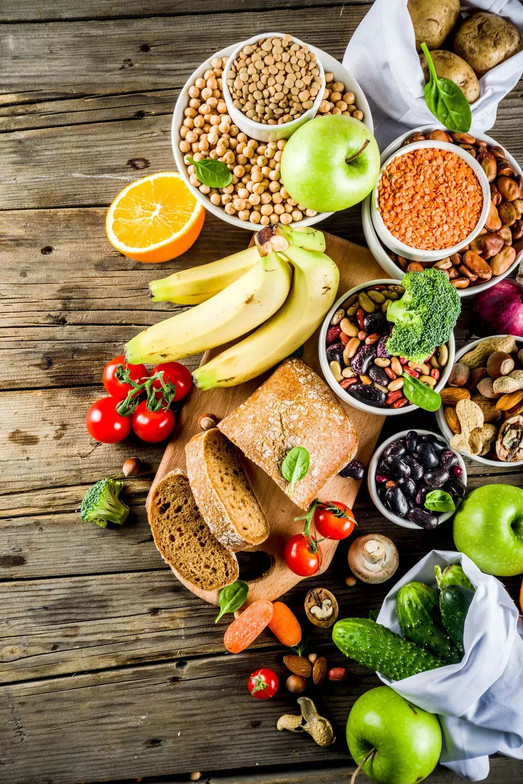
The Importance of Fiber: More Than Just Digestion
When most people think of dietary fiber, they typically associate it with digestion. While it's true that fiber is essential for maintaining regular bowel movements and preventing constipation, its benefits extend much further. Fiber also supports heart health, helps regulate blood sugar levels, and even plays a role in influencing the gut microbiome. Overall, fiber is one of the most potent nutrients we can incorporate into our diets.
Unfortunately, most Americans don't get enough. The average adult consumes about 15 grams of fiber per day, while the recommended intake is closer to 25–38 grams daily. Let's look at why fiber matters, the different types, and how you can get more of it into your diet.
What Is Fiber?
Fiber is a type of carbohydrate found in plant foods that the body can't fully digest. Unlike sugars and starches, fiber passes through the digestive tract relatively intact, but not without making an impact.
There are two main categories:
- Soluble fiber – Dissolves in water, forming a gel-like substance. It slows digestion, helps regulate blood sugar, and supports healthy cholesterol levels.
- Insoluble fiber – Adds bulk to stool and helps food pass more efficiently through the digestive system, preventing constipation.
Both types are essential, and most plant-based foods contain a mix of the two.
Fiber and Digestive Health
Fiber's role in digestion is well known, but it goes deeper than regularity. A high-fiber diet can:
- Promote a healthy gut microbiome by feeding beneficial bacteria.
- Reduce the risk of diverticulitis, hemorrhoids, and other GI conditions.
- Improve satiety, helping you feel fuller for longer.
This makes fiber an essential component of any diet aimed at long-term digestive health.
Fiber and Heart Health
Soluble fiber binds to cholesterol in the digestive system, helping lower LDL cholesterol levels. Studies have consistently shown that people who consume more fiber have a reduced risk of heart disease. Fiber may also help lower blood pressure and reduce systemic inflammation, both of which contribute to cardiovascular health.
Fiber and Blood Sugar Control
For individuals with diabetes—or anyone who wants steady energy—fiber is crucial. Because soluble fiber slows the absorption of sugar, it helps prevent sharp spikes and crashes in blood glucose. This effect makes fiber-rich foods especially valuable for managing insulin sensitivity and reducing the risk of type 2 diabetes.
Fiber, Weight Management, and Satiety
If you've ever noticed that a bowl of oatmeal keeps you full longer than a pastry, it's likely because of the fiber. Fiber slows digestion, increases satiety, and helps regulate appetite hormones. Diets rich in fiber are consistently linked to healthier body weights, even without strict calorie counting.
Fiber and the Gut-Brain Connection
Emerging research shows that fiber influences more than digestion and metabolism; it also affects the gut-brain axis. Certain fibers act as prebiotics, feeding beneficial gut bacteria that produce short-chain fatty acids (SCFAs). These SCFAs may play a role in mood regulation, immune health, and even cognitive function.
In other words, eating more fiber could support not just your body, but also your mind.
How Much Fiber Do You Need?
The Dietary Guidelines for Americans recommend:
- Women: about 21-25 grams per day
- Men: about 30-38 grams per day
Unfortunately, only about 5% of the population meets these goals.
Best Food Sources of Fiber
Fiber is abundant in plant-based foods. Some of the best sources include:
- Vegetables – Broccoli, Brussels sprouts, carrots, leafy greens
- Fruits – Apples, pears, berries, bananas, oranges
- Legumes – Beans, lentils, chickpeas, peas
- Whole grains – Oats, quinoa, brown rice, whole wheat bread
- Nuts and seeds – Chia seeds, flaxseeds, almonds
A balanced diet with a wide variety of plants ensures you get both soluble and insoluble fiber.
Tips for Increasing Fiber Intake
- Add vegetables to every meal.
- Choose whole grains over refined ones.
- Snack on nuts, seeds, or fruit instead of processed foods.
- Start the day with oatmeal or a fiber-rich cereal.
- Increase fiber intake gradually and drink plenty of water to avoid digestive discomfort.
Final Thoughts
Fiber may not be the most glamorous nutrient, but it's one of the most impactful. It supports digestion, heart health, blood sugar control, weight management, and even brain function. If your diet is lacking in plant-based foods, increasing your fiber intake may be one of the most straightforward yet most powerful steps you can take for better health.
At Arthrology Chiropractic, we believe in a whole-body approach to wellness. Nutrition is a key part of healing and long-term health, and small daily choices—like adding more fiber to your diet—can make a big difference over time.
If you're interested in learning more about how nutrition impacts your health—or how diet and lifestyle changes can support recovery and performance—schedule a consultation with Arthrology Chiropractic in Winston Salem today. Together, we'll create a plan that supports your body inside and out.

Edward Boudreau
Contact Me



.png)
